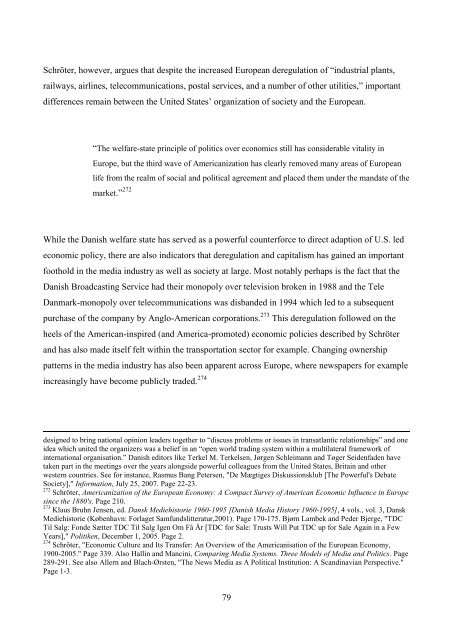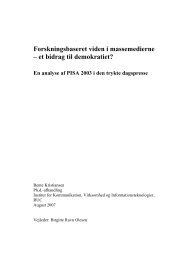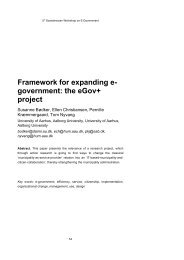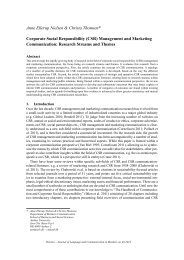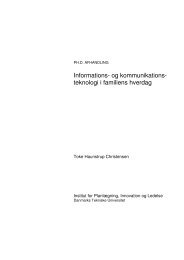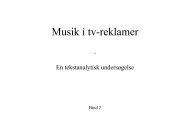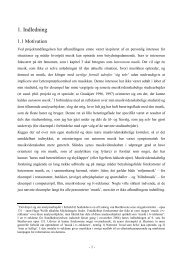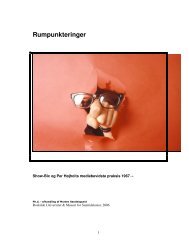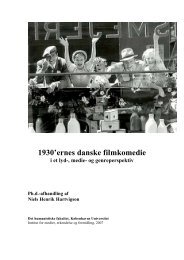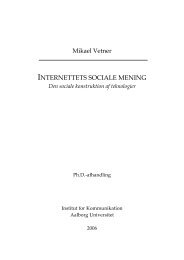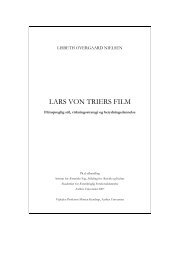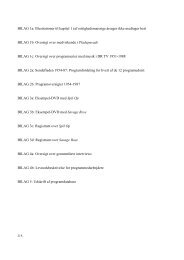The Jeremiad Over Journalism
The Jeremiad Over Journalism
The Jeremiad Over Journalism
You also want an ePaper? Increase the reach of your titles
YUMPU automatically turns print PDFs into web optimized ePapers that Google loves.
Schröter, however, argues that despite the increased European deregulation of ―industrial plants,<br />
railways, airlines, telecommunications, postal services, and a number of other utilities,‖ important<br />
differences remain between the United States‘ organization of society and the European.<br />
―<strong>The</strong> welfare-state principle of politics over economics still has considerable vitality in<br />
Europe, but the third wave of Americanization has clearly removed many areas of European<br />
life from the realm of social and political agreement and placed them under the mandate of the<br />
market.‖ 272<br />
While the Danish welfare state has served as a powerful counterforce to direct adaption of U.S. led<br />
economic policy, there are also indicators that deregulation and capitalism has gained an important<br />
foothold in the media industry as well as society at large. Most notably perhaps is the fact that the<br />
Danish Broadcasting Service had their monopoly over television broken in 1988 and the Tele<br />
Danmark-monopoly over telecommunications was disbanded in 1994 which led to a subsequent<br />
purchase of the company by Anglo-American corporations. 273 This deregulation followed on the<br />
heels of the American-inspired (and America-promoted) economic policies described by Schröter<br />
and has also made itself felt within the transportation sector for example. Changing ownership<br />
patterns in the media industry has also been apparent across Europe, where newspapers for example<br />
increasingly have become publicly traded. 274<br />
designed to bring national opinion leaders together to ―discuss problems or issues in transatlantic relationships‖ and one<br />
idea which united the organizers was a belief in an ―open world trading system within a multilateral framework of<br />
international organisation.‖ Danish editors like Terkel M. Terkelsen, Jørgen Schleimann and Tøger Seidenfaden have<br />
taken part in the meetings over the years alongside powerful colleagues from the United States, Britain and other<br />
western countries. See for instance, Rasmus Bang Petersen, "De Mægtiges Diskussionsklub [<strong>The</strong> Powerful's Debate<br />
Society]," Information, July 25, 2007. Page 22-23.<br />
272<br />
Schröter, Americanization of the European Economy: A Compact Survey of American Economic Influence in Europe<br />
since the 1880's. Page 210.<br />
273<br />
Klaus Bruhn Jensen, ed. Dansk Mediehistorie 1960-1995 [Danish Media History 1960-1995], 4 vols., vol. 3, Dansk<br />
Mediehistorie (København: Forlaget Samfundslitteratur,2001). Page 170-175. Bjørn Lambek and Peder Bjerge, "TDC<br />
Til Salg: Fonde Sætter TDC Til Salg Igen Om Få År [TDC for Sale: Trusts Will Put TDC up for Sale Again in a Few<br />
Years]," Politiken, December 1, 2005. Page 2.<br />
274<br />
Schröter, "Economic Culture and Its Transfer: An <strong>Over</strong>view of the Americanisation of the European Economy,<br />
1900-2005." Page 339. Also Hallin and Mancini, Comparing Media Systems. Three Models of Media and Politics. Page<br />
289-291. See also Allern and Blach-Ørsten, "<strong>The</strong> News Media as A Political Institution: A Scandinavian Perspective."<br />
Page 1-3.<br />
79


